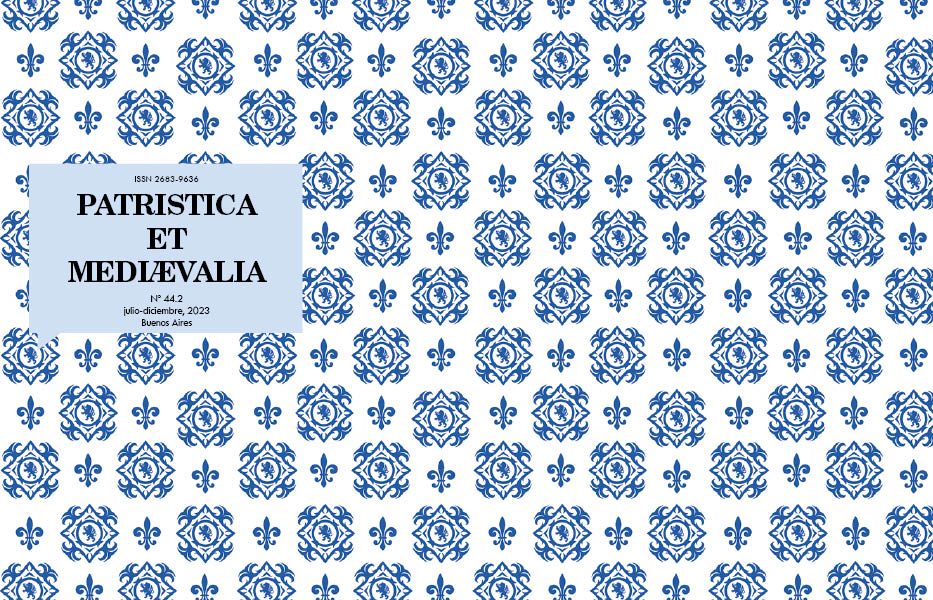Interhistorical dialogues: The Meister Eckhart of Michel Henry
Abstract
Michel Henry analyzes Meister Eckhart’s metaphysical proposal in paragraphs §§39, 40, and 49 of his The Essence of Manifestation. Starting from M. Henry’s views, this work explores Meister Eckhart’s direct approach to these issues. In this way, the mechanism behind this reception comes to light. It stresses the construction of Eckhart’s image in line indeed with some primary aspects of his theory but based on certain omissions that may cause the historical character of the German thinker to be lost. Observing what M. Henry decided not to comment on Eckhart’s system highlights what he chose to retrieve and what to avoid. In that sense, from the point of view of interhistorical dialogues, it is also helpful to observe what elements of Eckhart’s Christian Neoplatonism Henry accounted as valuable and which did not fit his system.Downloads
References
Meister Eckhart (2015). Lateinische Werke, Band 1.2, Prologi in Opus tripartitum, Expositio Libri Genesis, Ed. Sturlese, L., Stuttgart: Köhlhammer.
Meister Eckhart (2006). Lateinische Werke, Band V, In agro dominico, Ed. Zimmermann, A. y Sturlese, L., Stuttgart: Köhlhammer.
Meister Eckhart (1994). Lateinische Werke, Band 3, Expositio sancti Evangelii secundum Iohannem, Ed. Christ, K et al., Stuttgart: Köhlhammer.
Michel Henry (2015). “Eckhart”. En La esencia de la manifestación. Trad. García-Baró, M. y Huarte, M. Salamanca: Ediciones Sígueme, 303-319.
Michel Henry (2015). “El presupuesto ontológico fundamental del pensamiento de Eckhart y la esencia original del Logos”. En La esencia de la manifestación. Trad. García-Baró, M. y Huarte, M. Salamanca: Ediciones Sígueme, 319-327.
Michel Henry (2015). “La significación ontológica de la crítica del conocimiento en Eckhart”. En La esencia de la manifestación. Trad. García-Baró, M. y Huarte, M. Salamanca: Ediciones Sígueme, 407-419.
Aersten, J (1999). “Meister Eckhart. Eine außerordentliche Metaphysik”, Recherches de Theologie et Philosophie Medievales 66.1, 1-20.
Aersten, J. (2012a). “Meister Eckhart: Deus communis est”. En: Aersten, J. Medieval Philosophy as Transcendental Thought. Leiden - Boston: Brill, 330-370.
Aersten, J. (2012b). “La doctrine des transcendantaux de Maître Eckhart”. En: Casteigt, J. Maître Eckhart. París: CERF, 21-40.
Bara Bancel, S. (2022). “‘Saggase incréée’ et ‘sagesse participée’ selon Maître Eckhart”, Estudios eclesiásticos 97.380, 107-144. DOI: 10.14422/ee.v97.i380.y2022.004.
Casteigt, J. (2006). Connaissance et vérité chez Maître Eckhart. París: Vrin.
Castello, S. (2023). “Meister Eckhart. La naturaleza divina a través de la prueba de la reductio ad absurdum”, Scripta mediaevalia 16.1, 139-168.
Counet, J. M. (2012). “La morale d’Eckhart”. En: Casteigt, J., Maître Eckhart. París: CERF, 163-184.
De Libera, A. (1996). “L’Un ou la Trinité? Sur un aspecte trop connu de la théologie eckhartienne”, Revue des Sciences Religieuses 70.1, 31-47.
De Libera, A. (1994). Introduction à la Mystique rhénane. Paris: Éditions du Seuil.
Dobie, R. (2003). “Reason and Revelation in the Thought of Meister Eckhart”, The Thomist: A Speculative Quarterly Review 67.3, 409-438.
Goris, W. (1997). Einheit als Prinzip und Ziel. Leiden - Nueva York - Colonia: Brill.
Inverso, H. (2023). “Echoes of the Krisis in Contemporary French Phenomenology”. En: Inverso, H. y Schnell, A. (eds.). Crisis and Lifeworld: New Phenomenological Perspectives. Wurzburg: H. Alber.
Inverso, H. (2016). Fenomenología de lo inaparente. Buenos Aires: Prometeo, 233-268.
Langer, O. (2007). “Meister Eckharts Begründung einer neuen Theologie”, Meister Eckhart Jahrbuch 1, 1-25.
Largier, N. (1998). Theologie, Philosophie und Mystik bei Meister Eckhart. En: Aertsen, J. y Speer, A. (eds). Was ist Philosophie im Mittelalter? Berlín: De Gruyter, 704-711. (Miscellanea Mediaevalia 26).
Laoureux, S. (2001). “De ‘L’essence de la manifestation’ à ‘C’est moi la vérité’. La référence à Maître Eckhart dans la phénoménologie de Michel Henry”, Revue Philosophique de Louvain. Quatrième série 99.2, 220-253.
Mieth, D. (1980). “Gottesschau und Gottesgeburt”, Freiburger Zeitschrift für Philosophie und Theologie 27, 204-223.
Mojsisch, B. (1996). “‘Ce moi’ : la conception du moi de maître Eckhart. Une contribution aux ‘Lumières’ du Moyen-Age”, Revue des Sciences Religieuses 70.1, 18-30. DOI: https://doi.org/10.3406/rscir.1996.3344.
Reaidy, J. (2006). “Une relecture contemporaine de la naissance de Dieu dans l’âme par Michel Henry”. En: Vannier, M. A. (ed.), La naissance de Dieu dans l’âme chez Eckhart et Nicolas de Cues. París: CERF, 159-182.
Speer, A. (1998). “Ethica sive theologia. Wissenschaftseinteilung und Philosophieverständnis bei Eckhart”. En: Aertsen, J. y Speer, A. (eds). Was ist Philosophie im Mittelalter? Berlín: De Gruyter, 683-693. (Miscellanea Mediaevalia 26).
Speer, A. (2011). “The Division of Metaphysical Discourses: Boethius, Aquinas and Eckhart”. En: Emery, K., Friedman, R. y Speer, A. (eds). Philosophy and Theology in the Middle Ages. Leiden: Brill, 91-117.
Speer, A. (2013). “Are there One or Two Theologies?”, Medieval Mystical Theology 22.2, 139-154. DOI: 10.1179/2046572613Z.00000000010.
Szeftel, M. (2017). “Phänomenologie der Geburt: der Einfluss von Meister Eckhrt auf die Philosophie Michel Henrys”, Jahrbuch für Religionsphilosophie 16, 141-160.
Zahavi, D. (1999). “Michel Henry and the Phenomenology of the Invisible”, Continental Philosophy Review 32.3, 223-240.
1. The authors who publish in this magazine accept the following conditions:
-
They retain the copyright and grant to the magazine the right of the first publication, with the work registered under the Attribution-ShareAlike 4.0 International License that allows third parties to use what is published as long as they mention the authorship of the work and the first publication in this magazine.
-
They can make other independent and additional contractual agreements for the non-exclusive distribution of the version of the article published in this magazine (eg. include it in an institutional repository or publish it in a book) provided that they clearly indicate that the work was first published in this journal.
-
They are allowed and recommended to publish their work on the Internet (for example on institutional or personal pages).
2. AutoArchive Conditions. Authors are allowed and encouraged to distribute post-print electronic versions of their manuscripts because it promotes their circulation, a possible increase of quotation and a major reach among the Academic community. Color RoMEO: blue.













